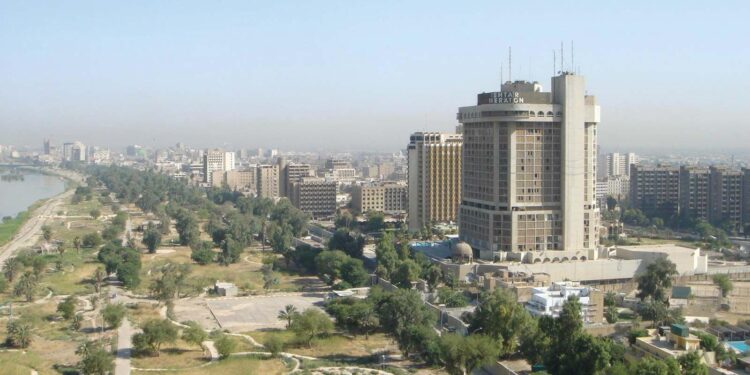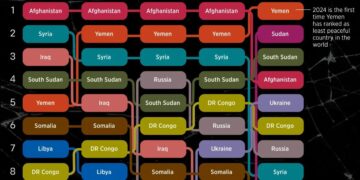US Urges Baghdad and Erbil to Resolve Fiscal Disputes for Iraq’s Economic Stability
In a notable diplomatic initiative, the United States has called on both the Iraqi central government in Baghdad and the Kurdistan Regional Government (KRG) based in Erbil to engage in meaningful negotiations aimed at settling a persistent financial disagreement. This dispute, centered around budget allocations and oil revenue sharing, has long hindered economic progress and political stability within Iraq. The US administration stresses that fostering cooperation between these two key entities is essential for ensuring sustainable development amid ongoing political complexities.
US Diplomatic Efforts to Bridge Fiscal Divides Between Baghdad and Erbil
The American government has ramped up its diplomatic engagement with Iraqi authorities, urging them to overcome entrenched fiscal conflicts that have strained relations between Baghdad and the KRG. With global oil markets experiencing volatility—oil prices fluctuated by over 20% in early 2024—the urgency for a unified financial approach grows stronger. Washington’s strategy focuses on:
- Encouraging Direct Dialogue: Promoting face-to-face talks between representatives of both governments to negotiate equitable budget distribution.
- Advocating Transparency: Supporting reforms aimed at improving fiscal accountability within both administrations.
- Enhancing Regional Security: Recognizing that resolving economic disputes is critical to preventing escalation of regional tensions.
The Iraqi federal government currently struggles with meeting public sector salary obligations, while the KRG faces challenges managing its own finances amid reduced federal transfers. Upcoming negotiations hold promise for alleviating these pressures through agreements such as:
| Potential Resolution | Description |
|---|---|
| Synchronized Budget Framework | A mutually agreed plan outlining fair budget shares aligned with each party’s needs. |
| Oil Revenue Allocation Mechanism | A transparent system ensuring consistent distribution of oil income between Baghdad and Erbil. |
| Bilateral Economic Support Packages | Pledges from international partners including the US offering financial aid contingent on cooperation. |
The Broader Economic Consequences of Prolonged Financial Disputes in Iraq
The unresolved fiscal disagreements have far-reaching effects beyond immediate budgetary concerns, impacting Iraq’s overall economic health. Both Baghdad and Erbil are pivotal players in Iraq’s oil industry—which accounts for nearly 90% of national revenue—and discord disrupts investor confidence across sectors. Key repercussions include:
- Dampened Foreign Investment: Political instability deters multinational corporations from committing capital essential for infrastructure projects.
- Inefficient Oil Production Levels: Conflicts contribute to inconsistent output rates; recent data shows production fluctuations exceeding 15%, influencing global energy markets significantly.
- Deterioration of Public Services:Budget shortfalls undermine funding for healthcare facilities, education systems, and social welfare programs affecting millions nationwide.
| Economic Indicator | Current Trend | Projected Impact | ||||||
|---|---|---|---|---|---|---|---|---|
| Task Item< / th > | Responsible Entity< / th > | Target Completion< / th > | ||||||
| Form Joint Financial Oversight Committee< / t d /> | Baghdad & KRG Representatives< />/t d /> | Within First Month After Talks Begin< />/t d /> |
A Path Forward Toward Stability And Prosperity In Iraq /h2
The resolution process extends beyond immediate monetary concerns; it represents an opportunity for forging durable partnerships grounded in mutual respect between Kurdistan Region authorities and their federal counterparts based out of Baghdad . Transparent communication channels combined with clearly defined roles will underpin future collaboration efforts . As international stakeholders — particularly Washington — continue monitoring developments closely , there remains cautious optimism that constructive engagement can unlock new avenues toward peace , security ,and shared prosperity throughout all regions affected . Ultimately , success hinges upon sustained commitment from all involved parties willing not onlyto negotiate but also implement agreed-upon frameworks effectively .
– Final Thoughts On Resolving The Budgetary Rift Between Baghd ad And Kurdistan Region-
Iraq continues grappling with significant obstacles stemming from unresolved financial disagreements separating its central government from autonomous Kurdish leadership . The United States’ call emphasizes how crucial cooperative dialogue remains if sustainable solutions benefiting all stakeholders are everto materialize . Prioritizing open communication alongside incremental progress offers hope amidst uncertainty surrounding regional politicsand economics alike . International actors remain invested giventhe strategic importanceof maintaining unitywithin oneofthe Middle East ’s most resource-rich nations.The coming monthswill likely prove decisivein determiningwhether longstanding divisionscan finally give way toa more harmonious future markedby shared growthand stabilityforallIraqis involved.














